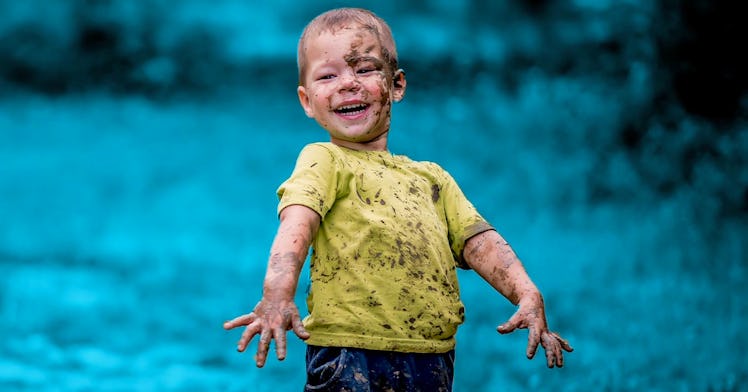Celebs Aren’t Bathing Their Kids, But They Can Afford It
The cool kids are a little stinky and dirty, but only if they have the privilege to pull it off.

All of a sudden, we care a lot about the bathing habits of Hollywood A-listers and their families. After all these months with nary a red carpet event, I suppose this is an expected evolution of American celebrity voyeurism. Cheap thrills and all that. But as we line up on either side of the bath wars, it’s worth recognizing that the choice of when and how often to bathe is a perk of wealth and privilege. And that’s not a perk everyone has.
For those who haven’t been keeping score at home, Ashton Kutcher and partner Mila Kunis only bathe their kids when they’re dirty, which is similar to Kristen Bell and Dax Shephard’s approach to waiting until their kids get stinky before they get a bath. As with most celebrity interest stories, none of this is prescriptive. Because at the end of the day, privilege allows any bathing philosophy a celebrity employs to work for them.
There’s an extent to which I see this privilege play out in my family and amongst my peers. We have friends who faithfully bathe their kids every day because they can. Access to water is never an issue, and the time is always available. My wife and I wash our kids far less frequently because we can, so we choose to spend time doing other things. Our kids each have a closet full of clothes, and we are perpetually doing laundry, so at the very least, a surface level refresh is always within arms reach.
But not everyone runs in circles where they suffer little to no blowback regardless of their cleanliness preferences. And for a lot of families, the ability to adhere to social standards remains elusive.
When I ran a leadership development program for adolescents near downtown Kansas City, I saw up close how those challenges played out. For example, some of the kids I worked with had just a couple of school uniforms for a five-day week. A high percentage didn’t have washers or dryers in their homes. And there were times when kids would sleep in various homes throughout the week, which meant they might wear the same outfit for 36+ straight hours.
These aspects of life that they had no control over held genuine social consequences. When the cool kids show up to school so fresh and so clean, those who can’t adhere to the standard find their appearance constantly used against them. And they certainly don’t get the benefit of the doubt when trying to operate in public spaces without the ability to ride on the winds of privilege. Labels like “hood rat” and “white trash” and “dirty Mexican” get slapped on at first glance and shade nearly every interaction. And more than any grime, in tight systems like schools and neighborhoods, those labels are incredibly difficult to scrub away.
Whether passionately or in jest, we can argue all we want about how often we should choose to bathe our kids, but an empathetic worldview holds in mind that a lot of parents don’t have that choice. Privilege checks should go hand-in-hand with the lessons we pass down to our kids about the importance of hygiene and grooming.
When we interact with folks whose hygiene disrupts our sensibilities, it’s worth asking why we care so much when people don’t meet our expectations? What choices might people make if they had viable alternatives? And most importantly: How we can increase opportunities for others while viewing those around us with more grace?